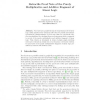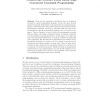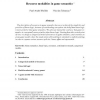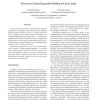LPAR
2007
Springer
13 years 10 months ago
2007
Springer
Proof nets are a parallel syntax for sequential proofs of linear logic, firstly introduced by Girard in 1987. Here we present and intrinsic (geometrical) characterization of proof...
FSTTCS
2007
Springer
13 years 10 months ago
2007
Springer
There are two somewhat contradictory ways of looking at modules in a given programming language. On the one hand, module systems are largely independent of the particulars of progr...
CSL
2007
Springer
13 years 10 months ago
2007
Springer
Abstract. Probably the most significant result concerning cut-free sequent calculus proofs in linear logic is the completeness of focused proofs. This completeness theorem has a n...
CSL
2007
Springer
13 years 10 months ago
2007
Springer
A focused proof system provides a normal form to cut-free proofs that structures the application of invertible and non-invertible inference rules. The focused proof system of Andre...
LICS
2007
IEEE
13 years 10 months ago
2007
IEEE
The description of resources in game semantics has never achieved the simplicity and precision of linear logic, because of a misleading conception: the belief that linear logic is...
ICRA
2007
IEEE
13 years 11 months ago
2007
IEEE
— Synthesis of robot behaviors towards nontrivial goals often requires reasoning about both discrete and continuous aspects of the underlying domain. Existing approaches in build...
LICS
2009
IEEE
13 years 11 months ago
2009
IEEE
Linear Logic is based on the analogy between algebraic linearity (i.e. commutation with sums and scalar products) and the computer science linearity (i.e. calling inputs only once...




